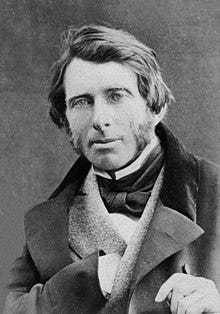Image: painted ironmongery. Left, with brushstrokes; right, without.
Above the image is a button for hearing a playground tiff of this article.
I don’t like spray painting. Well, let me qualify that: I like it on my car. But I don’t like it on the ironwork that’s dotted around my garden. What I like on my garden ironmongery is to see brush strokes. The physical reminder of the contact between object, paint, brush and artist. Tangible connections. John Ruskin. Spray painting introduces the element of thin air, and no contact.
It was someone I know who told me about John Ruskin and, if you’ve never heard of John Ruskin, I hope that it’s someone you know who is now telling you about John Ruskin, because John Ruskin was all about physical reminders of contact between object, artist and owner/admirer. It may cost more to renovate than to rebuild, but renovation tells us where we came from; rebuilding tells us where we are, but without compass orientation.
The same person I know who told me about John Ruskin also told me once (and I think it must have been in an unguarded moment) that he was a personal friend of a certain top-billing rock singer. You’ll know the name, but I’m not going to drop it, in case it sounds a clanger, like it did when the person I know dropped it in front of me. When it was thus dropped, there ensued a polite conversation about said rock star’s past performances, past rants (which I fully understood, of course), and past misbehaviour (boys will, after all, be boys). I was complimented on knowing the full titles to certain albums, and I had to bite my tongue when wanting to opine on what a tw*t the rock star had on occasion tended to be likened to (without of course actually being a tw*t). I refrained from enquiring whether the knowledge that the person I knew had of the person I didn’t know, but he did know, was biblical or otherwise in nature; but, even knowing how the person I knew knew the person I didn’t know felt like going out on the limb of effrontery. Look back at that paragraph, and you can now see what candour looks like when its shrouded in sotto voce secrecy.
On Facebook, some nosey questionnaire firm (probably not dissimilar to Cambridge Analytics) asked, “Who’s the most famous person you’ve ever met?” Someone else whom I also know, replied cryptically: HM (the H was feminine in those days). I replied in a comment: “So, tell me how you know Henry Mancini?” Clearly it wasn’t Henry Mancini, which is a shame, because I happen to very much like the Walk of the Baby Elephants; but, when he was pressed by me on the details of the encounter between said person I know and said person I don’t know, whom he said he did know, or had met, at least (gotta be careful there), said person I know was suddenly not at liberty to divulge such intimate details. So, I wondered aloud, what the heck was the reason he’d put up his craftily cryptic response to the, oh, so, fishy question. Unfortunately, on Facebook, you only ever get one response to a response.
Elton John and the Queen (oops, did I say that?), who, I can attest, did know each other, knew the respective people I know, and the people I know just happened to know each other. But, though I knew the people I know, I was no closer to knowing the people I didn’t know, despite knowing that the people I know know them (more candour shrouded in sotto voce secrecy). And, that’s not close enough for Ruskin.
And it’s not close enough for me. No brush strokes. No stroking at all. In fact, no touching, no knowing. You may know that I know that person, but you may not know them. What the hair-oil? Name-dropping is not irritating: it is extremely revelatory. It tells you not a whit about the name that’s dropped, but it speaks volumes about the dropper of the name. And so does an exclamation like “That was unprovoked!” Because that, too, betrays an unwillingness to enter the Ruskinesque proximity of brushstrokes. Like dropping “HM” as your closest famous encounter, whatever, we assume we always know the origin of provocation.
The attacks on Israel from Gaza are being coordinated by Russia, using Russian attack techniques. And we don’t like Russia, so Gaza is in the wrong. Ya-hoo Israel!
Maybe. I say nothing. That’ll be the Israel that put gagging orders over all its judiciary, yes? The one that is occupying territory it said it wouldn’t? Keeping six million Arabs from returning home, because of a justified (or otherwise) dog-in-the-manger, we-want-it all (where’s Freddie when you need him) policy? That Israel?
Like irredentism, the irridentist looks only to the last time they occupied the territory: who gives a fig for who it was they ejected from it when they moved in?
NATO provoked the Ukrainian war. That’s what some say. NATO was too accepting of applications to join its network from the newly revolutionised countries of eastern Europe. Some of whom are now making obvious overtures to the very archenemy that NATO was constituted in order to form a bulwark against. Oh dear. How did that happen?
Is it not obvious that Russia attacked Ukraine because Slovakia became a member of NATO? You know what? If this was a playground tiff, I’d hardly be able to believe my ears: Johnny hit Frankie because Eric went off and played with the girls.
“So, Johnny: why the heck didn’t you go and smack Eric? Why d’ya slug FRANKIE???”
“Well, truth is, I quite fancy Frankie’s skateboard, and if I can’t have it, no one’s gonna have it.”
“Johnny, if you’ve got a gripe with Eric and the girls, you go raise it with Eric and the girls. And f***ïng leave Frankie’s skateboard alone, you covetous little tw*t.”
“Look here, Mr Thompson, you can’t speak to me like that … this is modern politics, and behaving like kids in a playground is the norm. So, Mr Thompson … butt out.
Image: John Ruskin (by Messrs W. & D. Downey—public domain).





